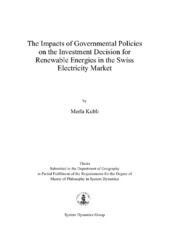The Impacts of governmental policies on the investment decision for renewable energies in the Swiss electricity market
| dc.contributor.author | Kubli, Merla | eng |
| dc.date.accessioned | 2014-10-06T11:24:55Z | |
| dc.date.available | 2014-10-06T11:24:55Z | |
| dc.date.issued | 2014-06-29 | eng |
| dc.date.submitted | 2014-06-29 | eng |
| dc.identifier.uri | https://hdl.handle.net/1956/8591 | |
| dc.description.abstract | Switzerland faces two major challenges in the electricity sector. The existing nuclear power plants will be phased out and at the same time new renewable electricity sources should increase their share in production. These shifts need to be managed while ensuring a secure electricity provision. The investment decision for the specific technologies is a central leverage point in the system. Currently a feed-in remuneration tariff policy with a fixed tariff is implemented to support new renewable energy technologies in their development. A System Dynamics simulation model is built to improve the understanding of central developments in the system and the interplay of different electricity technologies in the electricity production. The model is used to simulate likely developments of the Swiss electricity power plant park and test the effectiveness of feed-in remuneration policies. Results are gained on the long- term dynamics of capacity building of electricity technologies, depending on different public policies. This paper makes a practical contribution to the management of the energy transition by shedding a more dynamic light on the capacity expansion in relation to different forms of feed-in tariff policies. | en_US |
| dc.format.extent | 3147148 bytes | eng |
| dc.format.mimetype | application/pdf | eng |
| dc.language.iso | eng | eng |
| dc.publisher | The University of Bergen | eng |
| dc.title | The Impacts of governmental policies on the investment decision for renewable energies in the Swiss electricity market | eng |
| dc.type | Master thesis | en_US |
| dc.rights.holder | Copyright the author. All rights reserved | en_US |
| dc.description.localcode | GEO-SD360 | |
| dc.description.localcode | JMASV-SYSD | |
| dc.subject.nus | 733199 | eng |
| fs.subjectcode | GEO-SD360 |
Tilhørende fil(er)
Denne innførselen finnes i følgende samling(er)
-
Department of Geography [627]
